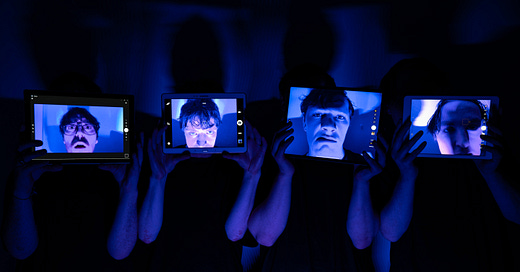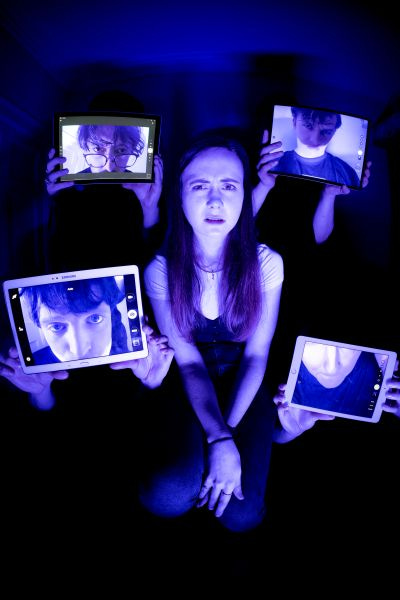A deep-dive into incel culture
After Adolescence became a phenomenon, there's now a comedy about incels. Plus! my first dungeons and dragons game
Jamie Sykes is a writer, director and improviser from Dublin who has a comedy show coming to London next week about Incels called The Last Incel. He talks about taking a deep-dive into the frightening world of incels, Ireland’s pilot scheme to fund artists and creative freedom.
EJ: How did you become interested incel culture?
JS: I think just through their seeping into pop culture. My angle on it was through video games. Like, video games were becoming more and more toxic to the culture around them.
EJ: In what way?
JS: Well, there was this famous movement called Gamergate that originated in 2012, where a lot of men were angry about women involved in gaming and that contained a lot of incel language and stuff.
And then that was how I first became aware of them. And then just as a phenomenon thought it was fascinating.
The Incels are invading. Credit Dean Ben Ayre
JS: They talk about the manosphere, the Andrew Tate stuff. It's partly an offshoot of that, which is like, there's this culture that paints the way you're supposed to get a woman and how men should engage with women. And it's contrived and not real.
EJ: I sort of thought that whole pick-up culture thing died away.
JS: That's when incels started. It was a reaction to pick a culture. And then it evolved into male influencers. Now, it'll cross your path, no matter what.
EJ: Yeah. It grew many heads. And what have you learnt about the world of incels since making this show?
JS: Terrible things. There's some real vile content. The language is crazy. And it's not just against women. There's a lot of racism and xenophobia. There's a real hierarchy of race as well in terms of attractiveness. White people are the most attractive, and then they have different terms…
EJ: When you were researching it - for the run at Edinburgh last year, were you limiting your exposure?
JS: Yeah, at first when I was looking at all this hateful stuff I thought, Oh, no, I've made a terrible mistake. This cannot be a comedy. It was a horrific idea. I contacted the organiser. It was like, I have to pull out of this festival. They set me up with a dramaturg who was super-helpful.
I think the upsetting thing is how wretched they are. Nobody's going to post that abuse online if life isn't going well for them, but they're truly just very sad, isolated young men who just don't know what they're doing, and they just, yeah, have had nowhere to turn to.
It's the one place where they felt vindicated or accepted in some way, so they latch onto it. And then It's inherently an isolated culture, so it becomes self-reinforcing.
Also what's shocking about it is how pointless it is as an ideology. There's no strict political movement to it. They don’t have anything they want to acheive as a group. It's so mean to themselves. They're like, ‘We live in a culture where only good-looking people get sex. Women only want to sleep with an attractive man. You are not attractive, so you will never be able to have sex.’
Puzzling to women: The Last Incel / Credit: Credit Dean Ben Ayre
They have the term like, blackpilling, like from the matrix. It's like when you've taken the black pill is when you've accepted the truth that no matter what you do, you will never have sex or a relationship or anything.
EJ: You've got to be quite down on yourself; depressed, anxious, all of those things to seek out fellow men who also feel shit about themselves.
And also not to say, okay, we want this to change. We want it to be better.
Although I did watch a documentary about an incel guy... And there were a few people who did this who were like, well, I'm not doing well as a man. I'm very short. I'm boring. I'm slight. Things are bad for me. But if I become a woman, that will give me benefit. So he transitioned to becoming a woman because he thought life would be better if he was a woman.
JS: It's so crazy. They're always like, women have it so much easier. They're like, women don't know what it's like to be judged for your beauty standards. It's the short-sightedness of it is crazy.
There's a lot of obsession with the male form and what's the correct body shape. There is some overlap in terms of thinking. That's interesting.
EJ: So tell me in your own words what your show is about and what you're trying to say.
JS: It's all set in a Discord meeting. So it's all set in a digital space. And it's about one of the incels, who basically goes out on his brother's stag party, and he manages to have a one-night stand, and they wake up the next day, and the woman joins their group meeting. And so she initially is shocked, but then she decides she's going to write an article about this because she's a journalist. And she just starts to slowly make them interrogate their beliefs for the first time. But the main goal of the show was to tell a show that was funny, because I think it is funny. I think the idea that you are frustrated becasue you think you can't have sex, and then your solution is to adopt a philosophy that guarantees nobody will ever want to have sex with you. That's very funny. But also, I think it's such a dark subject that It's such an unpleasant world to sit in that coming out of through comedy makes it a little more cathartic and bearable.
EJ: So on working differently, I speak to people who have started working differently from a normal 9 to 5. So how have you adapted your life to keep making shows? How does that work?
JS: Well, I'm in a really unusual situation because Ireland is I'm running a thing called the Basic Income for the Arts. It's a three-year trial period where they're giving people a basic income to work as an artist.
Keep reading with a 7-day free trial
Subscribe to Emily’s Substack - Working Differently to keep reading this post and get 7 days of free access to the full post archives.





